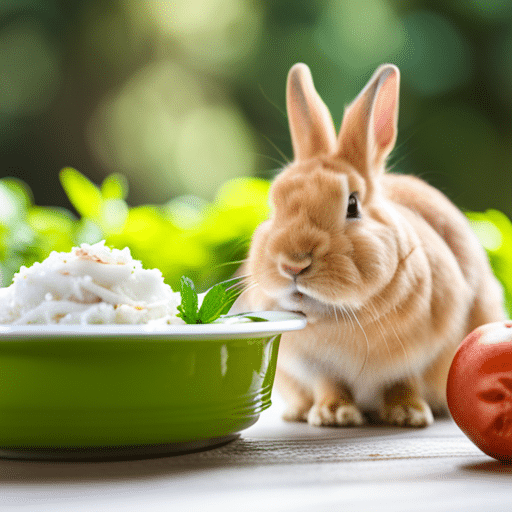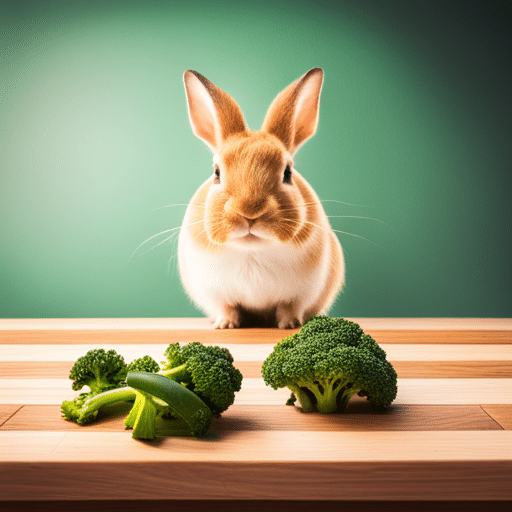When it comes to petting your baby rabbits eat broccoli, one of the most common questions is: “Can rabbits eat broccoli?”. The answer is yes – but only in moderation. Broccoli should not be a main part of your rabbit’s diet, as too much can lead to digestive issues and other health problems. However, when given as an occasional treat, broccoli can provide important vitamins and minerals that are beneficial for your pet rabbit’s overall health. It’s important to understand how much broccoli is safe for your rabbit so that you can keep them happy and healthy!
The Basics: Understanding a Rabbit’s Diet
When it comes to rabbits, their diet is very important. A healthy and balanced bunny’s diet should include hay, fresh vegetables, and a small amount of pellets. Hay should make up the bulk of your rabbit’s diet, as it provides essential fiber that helps with digestion. Fresh vegetables provide important vitamins and minerals that support overall health. And lastly, pellets are high in protein and other nutrients that help to keep your rabbit healthy.
A Quick Overview of a Healthy Rabbit’s Diet
A healthy rabbit diet should include hay, fresh vegetables, and a small amount of pellets. Hay should make up the bulk of your rabbit’s diet, providing essential fiber for digestion. Fresh vegetables provide important vitamins and minerals that support overall health. And finally, pellets are high in protein and other nutrients that keep your pet healthy.

Where Does Broccoli Fit in a Rabbit’s Diet?
Broccoli can be a healthy part of your rabbit’s diet but should not be the main focus. It’s best to give your rabbit eat broccoli as an occasional treat, no more than twice per week in small amounts. Too much broccoli can cause digestive issues and other health problems for your pet rabbit. When giving broccoli as a treat, it’s important to make sure it is cut into small, bite-sized pieces in order to avoid any choking hazards. Overall, broccoli should be given sparingly and only as an occasional treat for your pet rabbit.
Exploring the Nutritional Content of Broccoli
Broccoli contains a variety of important vitamins and minerals that are beneficial for your pet rabbit’s overall health. It is high in vitamins A, C, K, B-6, fiber, calcium, iron, magnesium, and potassium – making it an excellent source of nutrition. The nutrients found in broccoli can help boost the immune system while also aiding in digestion and providing your rabbit eat essential vitamins and minerals.
Vitamins and Minerals in Broccoli
Vitamin A – Vitamin A is essential for healthy skin, eyesight, and a strong immune system. It helps support vision and can help protect your rabbit against eye-related diseases such as cataracts.
Vitamin C – Vitamin C helps keep bones strong, aids in wound healing, and supports the production of collagen in the skin. This vitamin also helps to keep your rabbit’s immune system in top shape.
Vitamin K – Vitamin K is important for regulating blood clotting and maintaining healthy bones. It helps protect against bone-related diseases and can help prevent fractures or breaks.
B-6 – B-6 is an essential vitamin that helps with digestion, energy production, red blood cell formation, and metabolizing food. It also helps to keep the nervous system functioning properly.
Fiber – Fiber is essential for digestion and can help keep your rabbit’s digestive system running smoothly. Eating enough fiber can also help prevent too much weight gain by making you feel fuller longer.
Calcium – Calcium is important for strong bones and teeth, muscle contraction, and helps regulate the heartbeat. It is also important for keeping your rabbit’s bones strong and healthy.
Iron – Iron helps produce red blood cells which transport oxygen around the body. It is essential for energy production and a healthy immune system.
Magnesium – Magnesium helps to convert food into energy, maintains normal nerve and muscle function, and is essential for proper bone development.
Potassium – Potassium helps to regulate blood pressure, and also helps with muscle contractions and nerve impulses. It’s important for overall health and well-being.
Potential Risks of Overfeeding Broccoli
As with any food, it’s important to feed your pet rabbit broccoli in moderation. Too much broccoli can cause digestive issues and other health problems for your pet rabbit. It is best to give it as an occasional treat, no more than twice per week in small amounts. Additionally, when feeding your pet rabbit broccoli, make sure it is cut into small pieces in order to avoid any choking hazards. It’s also important to note that cooked broccoli is not suitable for rabbits, so always give it raw.

Can Rabbits Safely Eat Broccoli? Unpacking the Truth
When it comes to feeding broccoli to pet rabbits, the answer is yes – but only in moderation. Broccoli should not be a main part of your rabbit’s diet, as too much can lead to digestive issues and other health problems. However, when given as an occasional treat, broccoli can provide important vitamins and minerals that are beneficial for your pet rabbit’s overall health. It’s important to understand how much broccoli is safe for your rabbit so that you can keep them happy and healthy!
Digestive System of Rabbits: Why It Matters
When it comes to rabbits, their digestive system is especially sensitive. It is important to give your pet rabbit a balanced and varied diet that includes hay, fresh vegetables, and a small amount of pellets. Hay should make up the bulk of your rabbit’s diet, as it provides essential fiber that helps with digestion.
The Pros and Cons of Broccoli for Rabbits
The pros of giving your pet rabbit broccoli include added vitamins and minerals, a boost to the immune system, and aid in body weight and digestion. The cons include potential digestive issues and other health problems from overfeeding. It’s important to keep your pet’s diet balanced and only give broccoli as an occasional treat no more than twice per week in small amounts.
How to Safely Introduce Broccoli to Your Rabbit’s Diet
If you are introducing broccoli to your rabbit’s diet, it’s important to do so slowly. Start by offering small amounts of fresh, raw broccoli no more than twice per week. Always make sure that the pieces are bite-sized and that there is no risk of choking. Monitor your pet closely for any potential digestive issues or other health problems. If your rabbit does not seem to be adjusting well, reduce the amount or frequency of broccoli given and contact your vet for advice.
Starting Small: Portion Control for New Foods
As with any new food, it’s important to start small and increase the amount gradually. When introducing broccoli, start by offering a piece or two at a time and monitor your pet closely for any signs of digestive discomfort. As they become more comfortable eating broccoli, you can slowly increase the amount being given.
Observing Your Rabbit’s Reaction to Broccoli
As with any new food, it is important to observe your pet’s reaction to broccoli. Watch for signs of digestive discomfort or other health problems such as vomiting, diarrhea, lethargy, loss of appetite, or changes in behavior. If you notice any of these symptoms, it’s best to reduce the amount or frequency of broccoli being given and contact your vet for advice.

Frequently Asked Questions About Rabbits and Broccoli
Should I Cook or Serve Raw Broccoli?
It is best to serve raw broccoli for rabbits as cooked up broccoli leaves can cause digestive issues. Make sure that the pieces are bite-sized and there is no risk of choking.
Can Too Much Broccoli Make My Rabbit Sick?
Yes, too much broccoli can lead to digestive issues and other health problems. It’s important to give it as an occasional treat, no more than twice per week in small amounts.
How Often Can My Rabbit Have Broccoli?
It is best to give broccoli as an occasional treat, no more than twice per week in small amounts. Monitor your pet closely for any potential digestive issues or other health problems. If your rabbit does not seem to be adjusting well, reduce the amount or frequency of broccoli given and contact your vet for advice.
What Are the Benefits of Broccoli for Rabbits?
The benefits of broccoli for rabbits include added vitamins and minerals, a boost to the immune system, and aid in digestion. The high fiber content feed broccoli also helps with digestion and can help keep your rabbit’s digestive system running smoothly. It is also a good source of calcium which is important for strong bones and teeth, muscle contraction, and helps regulate the heartbeat. Additionally, it contains iron which helps produce red blood cells, magnesium which helps convert food into energy and maintain nerve and muscle function, and potassium which helps regulate blood pressure.
Are There Any Other Foods I Should Avoid Feeding My Rabbit?
Yes, there are other foods that should be avoided. These include any type of sweet or sugary treat, as well as potatoes, onions, garlic, and avocados. It is also important to avoid giving your rabbit too many pellets or treats, as this can lead to obesity.
Other Healthy Foods for Your Rabbit’s Diet
In addition to broccoli, there are other healthy foods that you can give your rabbit. Examples of these include fresh vegetables such as carrots, celery, and lettuce; hay; and a small amount of pellets. It is important to keep your pet’s diet balanced and provide them with the necessary nutrients for a healthy lifestyle.
In Conclusion: Can Rabbits Eat Broccoli?
Yes, rabbits can safely eat broccoli as an occasional treat. However, it’s important to keep in mind that too much broccoli can lead to digestive issues and other health problems. It is best to give your rabbits broccoli, no more than twice per week in small amounts. Monitor your pet closely for any potential signs of digestive discomfort or other health problems and contact your vet if necessary. Additionally, make sure that the pieces are bite-sized and there is no risk of choking. As with all new foods, start by offering a piece or two at a time and increase the amount gradually. Keeping these tips in mind will help ensure that you are providing your pet rabbit with the most beneficial diet possible!



